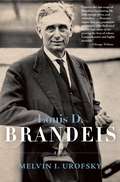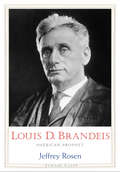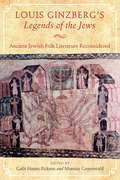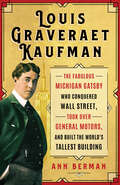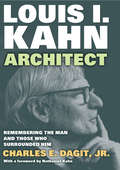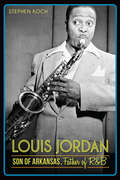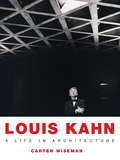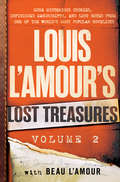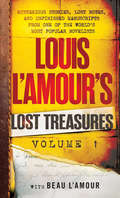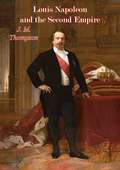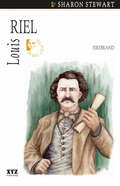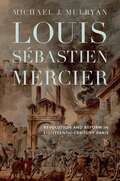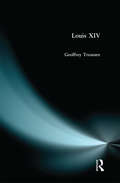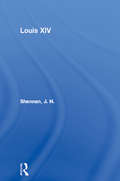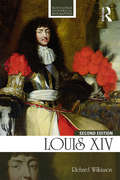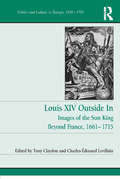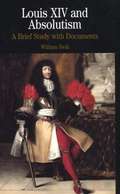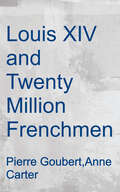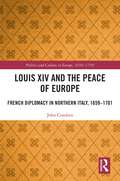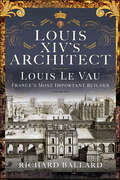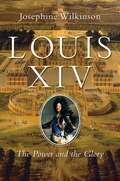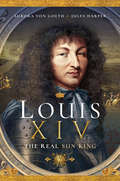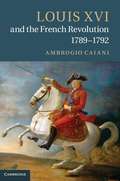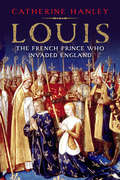- Table View
- List View
Louis D. Brandeis: A Life
by Melvin UrofskyThe first full-scale biography in twenty-five years of one of the most important and distinguished justices to sit on the Supreme Court-a book that reveals Louis D. Brandeis the reformer, lawyer, and jurist, and Brandeis the man, in all of his complexity, passion, and wit.A huge and galvanizing biography, a revelation of one man's effect on American society and jurisprudence, and the electrifying story of his time.ngs bank life insurance in Massachusetts (he considered it his most important contribution to the public weal) and was a driving force in the development of the Federal Reserve Act, the Clayton Antitrust Act, and the law establishing the Federal Trade Commission.Brandeis as an economist and moralist warned in 1914 that banking and stock brokering must be separate, and twenty years later, during the New Deal, his recommendation was finally enacted into law (the Glass-Steagall Act of 1933) but was undone by Ronald Reagan, which led to the savings-and-loan crisis in the 1980s and the world financial collapse of 2008.We see Brandeis, who came from a family of reformers and intellectuals who fled Europe and settled in Louisville. Brandeis the young man coming of age, who presented himself at Harvard Law School and convinced the school to admit him even though he was underage. Brandeis the lawyer and reformer, who in 1908 agreed to defend an Oregon law establishing maximum hours for women workers, and in so doing created an entirely new form of appellate brief that had only a few pages of legal citation and consisted mostly of factual references.Urofsky writes how Brandeis witnessed and suffered from the anti-Semitism rampant in the early twentieth century and, though not an observant Jew, with the outbreak of the Great War in 1914, became at age fifty-eight head of the American Zionist movement. During the next seven years, Brandeis transformed it from a marginal activity into a powerful force in American Jewish affairs. We see the brutal six-month confirmation battle after Wilson named the fifty-nine-year-old Brandeis to the court in 1916; the bitter fight between progressives and conservative leaders of the bar, finance, and manufacturing, who, while never directly attacking him as a Jew, described Brandeis as "a striver," "self-advertiser," "a disturbing element in any gentleman's club." Even the president of Harvard, A. Lawrence Lowell, signed a petition accusing Brandeis of lacking "judicial temperament." And we see, finally, how, during his twenty-three years on the court, this giant of a man and an intellect developed the modern jurisprudence of free speech, the doctrine of a constitutionally protected right to privacy, and suggested what became known as the doctrine of incorporation, by which the Bill of Rights came to apply to the states. Brandeis took his seat when the old classical jurisprudence still held sway, and he tried to teach both his colleagues and the public- especially the law schools-that the law had to change to keep up with the economy and society. Brandeis often said, "My faith in time is great." Eventually the Supreme Court adopted every one of his dissents as the correct constitutional interpretation. A huge and galvanizing biography, a revelation of one man's effect on American society and jurisprudence, and the electrifying story of his time.From the Hardcover edition.
Louis D. Brandeis: American Prophet
by Jeffrey RosenAccording to Jeffrey Rosen, Louis D. Brandeis was "the Jewish Jefferson," the greatest critic of what he called "the curse of bigness," in business and government, since the author of the Declaration of Independence. Published to commemorate the hundredth anniversary of his Supreme Court confirmation on June 1, 1916, Louis D. Brandeis: American Prophet argues that Brandeis was the most farseeing constitutional philosopher of the twentieth century. In addition to writing the most famous article on the right to privacy, he also wrote the most important Supreme Court opinions about free speech, freedom from government surveillance, and freedom of thought and opinion. And as the leader of the American Zionist movement, he convinced Woodrow Wilson and the British government to recognize a Jewish homeland in Palestine. Combining narrative biography with a passionate argument for why Brandeis matters today, Rosen explores what Brandeis, the Jeffersonian prophet, can teach us about historic and contemporary questions involving the Constitution, monopoly, corporate and federal power, technology, privacy, free speech, and Zionism.
Louis Ginzberg's Legends of the Jews: Ancient Jewish Folk Literature Reconsidered (Raphael Patai Series in Jewish Folklore and Anthropology)
by Galit Hasan-Rokem Ithamar GruenwaldAt the beginning of the twentieth century, many perceived American Jewry to be in a state of crisis as traditions of faith faced modern sensibilities. Published beginning in 1909, Rabbi and Professor Louis Ginzberg's seven-volume The Legends of the Jews appeared at this crucial time and offered a landmark synthesis of aggadah from classical Rabbinic literature and ancient folk legends from a number of cultures. It remains a hugely influential work of scholarship from a man who shaped American Conservative Judaism. In Louis Ginzberg's Legends of the Jews: Ancient Jewish Folk Literature Reconsidered, editors Galit Hasan-Rokem and Ithamar Gruenwald present a range of reflections on the Legends, inspired by two plenary sessions devoted to its centennial at the Fifteenth Congress of the World Association of Jewish Studies in August 2009. In order to provide readers with the broadest possible view of Ginzberg's colossal project and its repercussions in contemporary scholarship, the editors gathered leading scholars to address it from a variety of historical, philological, philosophical, and methodological perspectives. Contributors give special regard to the academic expertise and professional identity of the author of the Legends as a folklore scholar and include discussions on the folkloristic underpinnings of The Legends of the Jews. They also investigate, each according to her or his disciplinary framework, the uniqueness, strengths, and weakness of the project. An introduction by Rebecca Schorsch and a preface by Galit Hasan-Rokem further highlight the folk narrative aspects of the work in addition to the articles themselves. The present volume makes clear the historical and scholarly context of Ginzberg's milestone work as well as the methodological and theoretical issues that emerge from studying it and other forms of aggadic literature. Scholars of Jewish folklore as well as of Talmudic-Midrashic literature will find this volume to be invaluable reading.
Louis Graveraet Kaufman: The Fabulous Michigan Gatsby Who Conquered Wall Street, Took Over General Motors, and Built the World's Tallest Building (Painted Turtle Press)
by Ann BermanDiscover the extraordinary rise of a glamorous and significant American banking titan. This fascinating biography recounts the life and legacy of a titan of American banking, Louis Graveraet Kaufman (1870–1942). Also known as LG, he was a Gatsbyesque figure born in Michigan's Upper Peninsula who married into great wealth and then amassed far more of his own. Under LG, New York's Chatham Phenix National Bank and Trust Company became one of the nation's largest banks and the first in New York to boast a network of branches. When he was denied entry into the exclusive, Protestant, old-money Huron Mountain Club, LG responded by building his own retreat: the world's largest log lodge, a 26,000-square-foot behemoth near Marquette, Michigan. Christened Granot Loma, it became the site of lavish Prohibition-era parties, attracting many celebrities who came in private rail cars to enjoy jazz and liquor chez Kaufman. A darling of the press, LG became a household name, making news by coordinating the famous takeover of General Motors in 1916, narrowly escaping death in the Wall Street Bombing of 1920, and financing the Empire State Building during the Great Depression. Author Ann Berman highlights Kaufman's remarkable journey from "barefoot boy" to trailblazing branch banking giant, proving LG was not just a man of his time but one worth reading about over a century later.
Louis I. KahnArchitect: Remembering the Man and Those Who Surrounded Him
by Jr. Charles DagitFew people in the history of art and architecture have planted a seed of inspiration that grew to become a towering oak of lasting influence. There are those, particularly colleagues and students of Louis I. Kahn, who would say that he was one of these people. Certainly Kahn was one of the foremost architects of the twentieth century, designing such famous landmarks as the National Assembly Building in Dhaka, Bangladesh; the Salk Institute in La Jolla, California; and the Kimbell Museum in Fort Worth, Texas. In this commemorative volume, Charles E. Dagit, Jr. shows the power and influence that Kahn displayed at the University of Pennsylvania department of architecture in the 1960s. Since Dagit knew Kahn personally, this is a factual history as well as a glimpse into Kahn's personal wisdom and humanity. Beginning with a prelude that starts with the author's undergraduate years at the University of Pennsylvania, Dagit launches readers on an intellectual journey of how he first met Kahn. From there he details his experiences with Kahn and explores Kahn's interactions with Penn faculty members, including Mario Romanach, Robert Le Ricolet and Aldo Giurgola. This first-hand account sheds fascinating new light on one of the most prominent architects of the twentieth century.
Louis Jordan: Son of Arkansas, Father of R&B (Music Ser.)
by Stephen KochThough you may not know the man, you probably know his music. Arkansas-born Louis Jordan's songs like "Baby, It's Cold Outside," "Caldonia" and "Ain't Nobody Here But Us Chickens" can still be heard today, decades since Jordan ruled the charts. In his five-decade career, Jordan influenced American popular music, film and more and inspired the likes of James Brown, B.B. King, Chuck Berry and Ray Charles. Known as the "King of the Jukeboxes," he and his combo played a hybrid of jazz, swing, blues and comedy music during the big band era that became the start of R&B. In a stunning narrative portrait of Louis Jordan, author Stephen Koch contextualizes the great, forgotten musician among his musical peers, those he influenced and the musical present.
Louis Kahn: A Life in Architecture
by Carter WisemanThe man who envisioned and realized such landmark buildings as the Salk Institute, the Kimbell Art Museum, and the National Assembly complex in Bangladesh, Louis Kahn was born in what is now Estonia, immigrated to America, and became one of the towering figures in his adopted country’s built world. His works are unmistakable in their elegance, monolithic power, and architectural honesty.Written by Carter Wiseman, one of Kahn’s most respected commentators, this book offers a succinct, accessible examination of the life and work of one of America’s greatest architects. It traces the influence of his immigrant origins, his upbringing in poverty, his education, the impact of the Great Depression, and the arrival of Modernism on his life and work. Finally, it provides insight into why, as the legacy of many of his contemporaries has receded in importance, Kahn’s has remained so durably influential. Louis Kahn: A Life in Architecture provides the best concise introduction available to this singular life and achievement.
Louis L'Amour's Lost Treasures: More Mysterious Stories, Unfinished Manuscripts, and Lost Notes from One of the World's Most Popular Novelists (Louis L'Amour's Lost Treasures)
by Louis L'Amour Beau L'Amour&“L&’Amour is popular for all the right reasons. His books embody heroic virtues that seem to matter now more than ever.&”—The Wall Street Journal More unpublished works from the archives of Louis L&’Amour: complete short stories, partial novels, treatments, and notes that will transport readers from the Western frontier to India, China, and even the future.Exploring the creative process of an American original, the Louis L&’Amour&’s Lost Treasures series will uncover the hidden history behind the author&’s best known novels . . . and his most mysterious and ambitious unfinished works.In this second volume, Beau L&’Amour examines how his father made the transition from struggling pulp writer to successful novelist and uses his father&’s notes, journal entries, and correspondence to continue the process of seeking out how and why many of these never-before-seen manuscripts were written as well as speculating about the ways they might have ended. These selections include the beginnings of a post-apocalyptic science fiction tale, a proposal for a nonfiction project based on the life of Renaissance-era traveler Ibn Batuta, and two chapters of a historical novel set in India about the origin of L'Amour's well-known Talon family. At the other end of the spectrum are classic adventures, such as &“In the Measure of Time,&” a chance encounter set on the high seas, and a science fiction film treatment set in Mexico, as well as seventeen chapters of a novel that reappears throughout Louis&’s journals and letters and speaks to his fascination with post-revolutionary 1950s China, leading him so far as to correspond with the Dalai Lama. With rare photographs and commentary, this book further maps the journey L&’Amour embarked upon to become one of our greatest storytellers and the diverse realms to which his imagination traveled, making him a true American pioneer.
Louis L'Amour's Lost Treasures: Unfinished Manuscripts, Mysterious Stories, and Lost Notes from One of the World's Most Popular Novelists (Louis L'Amour's Lost Treasures)
by Louis L'AmourThe first of its kind, a unique volume of twenty-one unpublished gems from one of the twentieth century’s most popular and prolific writers Exploring the creative process of an American original, the Louis L’Amour’s Lost Treasures project will uncover the hidden history behind the author’s best known novels . . . and his most mysterious and ambitious unfinished works. In this first collection, Beau L’Amour presents many never-before-seen manuscripts. Using his father’s handwritten notes, journal entries, and correspondence, along with his own memories, Beau uncovers how and why they were written, as well as speculating about the ways they might have ended. These selections celebrate L’Amour’s vision and virtuosity, including the first seven chapters of a powerful novel about the Trail of Tears, a chilling Western horror story, and a tale of the American Revolution featuring a character related to L’Amour’s well-known Sackett family. At the other end of the spectrum are classic adventures, such as The Golden Tapestry, set in 1960s Istanbul, as well as several uniquely different attempts at what would have been the most profoundly intimate of all of L’Amour’s novels, a saga of reincarnation that stretches from a time before time, to the period of Alexander the Great, and on to Warlord-Era China. Illustrated with rare photographs and copies of handwritten notes, this book reveals the L’Amour you have never known, his personal struggles as a writer, and the contest between mortality and a literary legacy too big for one life to contain.Louis L’Amour’s Lost Treasures is a project created to release some of the author’s more unconventional manuscripts from the family archives. In Louis L’Amour’s Lost Treasures: Volumes 1, Beau L’Amour takes the reader on a guided tour through many of the finished and unfinished short stories, novels, and treatments that his father was never able to publish during his lifetime. L’Amour’s never-before-seen first novel, No Traveller Returns, will also be released as a Lost Treasures publication, followed by Louis L’Amour’s Lost Treasures: Volume 2. Additionally, many beloved classics will be rereleased with an exclusive Lost Treasures postscript featuring previously unpublished material, including outlines, plot notes, and alternate drafts. These postscripts tell the story behind the stories that millions of readers have come to know and cherish.
Louis Napoleon and the Second Empire
by J. M. ThompsonAn excellent one volume portrait of Napoleon III and the short-lived second French Empire which was brought to ruins by the 1870 Franco-Prussian war.“ONCE again J. M. Thompson has given us a colorful, arresting, and interpretative account of a period of French history—this time of the Second Empire. In this instance, as in previous works, the author makes the biography of a man (Louis Napoleon) the vehicle for a history of a period, thereby infusing the warmth of a very human personality throughout the history of a complex and fateful era. Thus we follow the life of a man who followed his star of fate from youthful refugee to insurrectionist, prisoner, president, emperor, economic reformer, arbiter of a continent, prisoner-of-war, and, alas, to refugee again until death.Nothing of the romance, the contrasts, the shaded significances is lost by the author's telling. Those who have read his French Revolution and Napoleon Bonaparte cannot fail to discern and appreciate the same trenchant pen and deft brush which restore life and odor to a much-told tale of the past. While Mr. Thompson does not attempt to conceal the faults and mistakes of the man, in the main he joins with some current revisionists in understanding (not justifying) the "crime of December 2nd" and crediting Napoleon Ili with constructive policies at home and abroad and exonerating him of the major responsibility for the outbreak of the war of 1870. The author rightly blames Bismarck and French public opinion of all classes for pushing Louis Napoleon into the war (p. 272) rather than just a small war party and the empress.”-Lynn M. Case
Louis Riel: Firebrand
by Sharon StewartLouis Riel devoted his life to the Metis cause. A fiery activist, he struggled against injustice as he saw it. He was a pioneer in the field of Aboriginal rights and land claims but was branded an outlaw in his own time. In 1885, he was executed for treason. In 1992, the House of Commons declared Riel a founder of Manitoba. November 16 is now designated Louis Riel Day in Canada.
Louis Sébastien Mercier: Revolution and Reform in Eighteenth-Century Paris (Transits: Literature, Thought & Culture, 1650-1850)
by Michael J. MulryanFrench playwright, novelist, activist, and journalist Louis Sébastien Mercier (1740–1814) passionately captured scenes of social injustice in pre-Revolutionary Paris in his prolific oeuvre but today remains an understudied writer. In this penetrating study—the first in English devoted to Mercier in decades—Michael Mulryan explores his unpublished writings and urban chronicles, Tableau de Paris (1781–88) and Le Nouveau Paris (1798), in which he identified the city as a microcosm of national societal problems, detailed the conditions of the laboring poor, encouraged educational reform, and confronted universal social ills. Mercier’s rich writings speak powerfully to the sociopolitical problems that continue to afflict us as political leaders manipulate public debate and encourage absolutist thinking, deepening social divides. An outcast for his polemical views during his lifetime, Mercier has been called the founder of modern urban discourse, and his work a precursor to investigative journalism. This sensitive study returns him to his rightful place among Enlightenment thinkers.
Louis XIII, The Just
by A. Lloyd MooteIn this fascinating biography, A. Lloyd Moote provides the first authoritative account of one of the most enigmatic figures of seventeenth-century Europe. Contrary to popular portrayals of the monarch as a hapless King, Moote argues that Louis XIII was a ruler who powerfully shaped his people's destiny.
Louis XIV
by Geoffrey R TreasureLouis IV represents the apogee of French royal power and the Ancien Regime. Having restored the nation's finances and rebuilt the army, he embarked on a series of wars of conquest which made France universally feared and respected as the central power of continental Europe. In the age of Moliere, Corneille, Racine et al, French culture blossomed at the court of Versailles. The counterpoint to these achievements was the emasculation of the political and legal institutions that might have limited the exercise of the royal will. In this new history, Geoffrey Treasure explores a unique combination of a personal philosophy, moulded by absolutist thinking and propaganda, and by Marzarin's deliberate training. He examines the influences and traits which permitted the growth of this particular exercise of power and its descent into an absolutism that ultimately set France on the road to 1789.
Louis XIV (Lancaster Pamphlets)
by J. H. ShennanLooks at the king and his beliefs, domestic problems, and foreign policy.
Louis XIV (Routledge Historical Biographies)
by Richard WilkinsonLouis XIV ruled France for more than half a century and is typically remembered for his absolutism, his patronage of the arts and his lavish lifestyle – culminating in the building of Versailles. This original and lively biography focuses on Louis’s personal life while keeping the needs of the history student at the forefront, featuring analysis of Louis’s wider significance in history and the surrounding historiography. This book balances the undeniable cultural achievements of the reign against the realities of Louis’s egotism and argues that, when viewed critically, Louis’s rule (1643–1715) personified the disadvantages of absolute monarchy, and inexorably led to social and political blunders, resulting in the suffering of millions. Richard Wilkinson demonstrates that while Louis excelled as a self-publicist, he fell far short of being a great monarch. This second edition includes an up-to-date and accessible biography, further sections on the women at Louis’s court, France in an international context and new material looking at Louis’s involvement in ballet. This book is essential reading for all history students and those with a general interest in one of history’s most colourful rulers.
Louis XIV Outside In: Images of the Sun King Beyond France, 1661-1715 (Politics and Culture in Europe, 1650-1750)
by Tony Claydon Charles-Édouard LevillainLouis XIV - the ’Sun King’ - casts a long shadow over the history of seventeenth- and eighteenth-century Europe. Yet while he has been the subject of numerous works, much of the scholarship remains firmly rooted within national frameworks and traditions. Thus in France Louis is still chiefly remembered for the splendid baroque culture his reign ushered in, and his political achievements in wielding together a strong centralised French state; whereas in England, the Netherlands and other protestant states, his memory is that of an aggressive military tyrant and persecutor of non-Catholics. In order to try to break free of such parochial strictures, this volume builds upon the approach of scholars such as Ragnhild Hatton who have attempted to situate Louis’ legacy within broader, pan-European context. But where Hatton focused primarily on geo-political themes, Louis XIV Outside In introduces current interests in cultural history, integrating aspects of artistic, literary and musical themes. In particular it examines the formulation and use of images of Louis XIV abroad, concentrating on Louis' neighbours in north west Europe. This broad geographical coverage demonstrates how images of Louis XIV were moulded by the polemical needs of people far from Versailles, and distorted from any French originals by the particular political and cultural circumstances of diverse nations. Because the French regime’s ability to control the public image of its leader was very limited, the collection highlights how - at least in the sphere of public presentation - his power was frequently denied, subverted, or appropriated to very different purposes, questioning the limits of his absolutism which has also been such a feature of recent work.
Louis XIV and Absolutism: A Brief Study with Documents (A Bedford Series in History and Culture)
by William BeikThis unique collection of documents with commentary explores the meaning of absolute monarchy by examining how Louis XIV of France became one of Europe's most famous and successful rulers. In the introduction, William Beik succinctly integrates the theoretical and practical nature of absolutism and its implications for the development of European states and society.
Louis XIV and Twenty-Million Frenchmen: A New Approach: Exploring The Interrelationship Between the People of a Country and the Power of its King
by Pierre GoubertLouis XIV is one of history’s most notorious rulers. Ruling for three quarters of a century, the King of France had the longest reign in European history, and the effects of his rule would create the conditions that would lead to the French Revolution. Written by an authority on 17th century Europe, Pierre Goubert not only outlines the life the famous “Sun King." but the millions of subjects under his rule, and the effects his choices had on the them.
Louis XIV and the Peace of Europe: French Diplomacy in Northern Italy, 1659 – 1701 (ISSN)
by John CondrenIn recent generations, the study of dynastic politics and diplomatic history has undergone a revival. This field provides invaluable context for understanding international relations and focuses on aspects of cultural exchange and intellectual currents far more than previously. The “age of Louis XIV” has not been immune from this resurrection of interest in foreign policy and the conduct of diplomacy.This book is the first serious full-length study of Louis XIV’s diplomatic relations with the small states of northern Italy, specifically the duchies of Parma, Modena, and Mantua-Monferrato. Louis’s desire to be seen as a peacemaker (despite his obvious bellicosity) extended to Italy, where he asserted the French crown’s potential as a broker of peace between rival dynasties. But his evident self-interest, and the need to preserve France’s perceived traditional alliance with the House of Savoy, undermined these efforts. He also failed to defend the interests of the dukes of Parma and Modena in their quarrels with the Holy See. After apparent successes in the Franco-Dutch War, Louis believed that he could undermine Spanish influence over the princes of Italy. But his attempts to do so antagonised both the Austrian and Spanish Habsburgs and the Lombardy dukes themselves, resulting in renewed war.Louis XIV and the Peace of Europe analyses diplomatic culture at Versailles and at the small Italian courts, and assesses examples of artistic exchange. It will be valuable reading for undergraduates, graduate students, and historians of the field, as well as for those interested in Louis XIV and Italian culture more generally.
Louis XIV's Architect: Louis Le Vau, France's Most Important Builder
by Richard BallardA must-read for those seeking to understand the intersection of politics and art in a pivotal moment of European history. This is a study of royal absolutism in a most extreme form in modern European history, and of the nature of Louis XIV's concept of personal glory and of the embodiment of France as a new superpower. It is a study of political ideas expressed in architecture to establish Versailles as the centre of French world power and royal prestige. It is also a personal story, full of social, cultural, and economic history of the period as seen in the life and work of Louis Le Vau, from a humble family of craftsmen, who was a self-taught architect in the early history of the profession, skilled in technical craft skills and even grand design. He was a major contributor to the architectural glories of Paris including the Louvre, Vincennes, Versailles and the College of the Four Nations. And all achieved despite interference from the great magnates of the age like Mazarin and Colbert and constant mind-changing by the King who wanted every feature in the buildings to reflect his concept of personal, royal, prestige. Le Vau was Louis XIV's First Architect from 1654 until his death and disgrace in 1670. The social, cultural, economic and political backdrop is striking with court intrigue, scandal, corruption, luxury, indulgence and the rise of a rich bourgeoisie, but the main thrust of the story concerns Louis XIV and the royal personal ambition, and the work of a stone-cutter's son who became the Sun King's instrument. The study is good on the more technical features of architectural history - reminiscent of Pevsner's marvellous Buildings of England series.
Louis XIV: The Gift From God
by Josephine WilkinsonAn intelligent, authoritative, and often surprising biography of the most famous of French monarchs, by an acclaimed biographer and historian. This stylish and incisive narrative presents readers with a fresh perspective on one of the most fascinating kings in European history. Louis XIV’s story has all the ingredients of a Dumas classic: legendary beginnings, beguiling women, court intrigue, a mysterious prisoner in an iron mask, lavish court entertainments, the scandal of a mistress who was immersed in the dark arts, and a central character who is handsome and romantic, but with a frighteningly dark side to his character. Louis believed himself to be semi-divine. His self-identification as the Sun King, which was reflected in iconography by the sun god, Apollo, influenced every aspect of Louis’s life: his political philosophy, his wars, and his relationships with courtiers and subjects. As a military strategist, Louis’s capacity was ambiguous, but he was an astute politician who led his country to the heights of sophistication and power—and then had the misfortune to live long enough to see it all crumble away. As the sun began to set upon this most glorious of reigns, it brought a gathering darkness filled with the anguish of dead heirs, threatened borders, and a populace that was dangerously dependent upon—but greatly distanced from—its king.
Louis XIV: The Real Sun King
by Jules Harper Aurora von GoethA concise, straightforward biography of the seventeenth-century French monarch and his seventy-two-year reign. Innovator. Tyrant. Consummate showman. Passionate lover of women. After the death of King Louis XIII in 1643, the French crown went to his first-born son and heir, four-year old Louis XIV. In the extraordinary seventy-two years that followed, Louis le Grand—France&’s self-styled &“Sun King&”—ruled France and its people, leaving his unique and permanent mark on history and shaping fashion, art, culture and architecture like none other before. This frank and concise book gives the reader a personal glimpse into the Sun King&’s life and times as we follow his rise in power and influence: from a miraculous royal birth no one ever expected to the rise of king as absolute monarch, through the evolution of the glittering Château de Versailles, scandals and poison, four wars and many more mistresses . . . right up to his final days. Absolute monarch. Appointed by God. This is Louis XIV, the man. We will uncover his glorious and not-so-glorious obsessions. His debilitating health issues. His drive and passions. And we will dispel some myths, plus reveal the people in his intimate circle working behind the scenes on the Louis propaganda machine to ensure his legacy stayed in the history books forever. This easy-to-read narrative is accompanied by a plethora of little-known artworks, so if you&’re a Louis XIV fan or student, or just eager to know more about France&’s most famous king, we invite you to delve into court life of seventeenth-century French aristocracy, the period known as Le Grand Siècle—&“The Grand Century.&”
Louis XVI and the French Revolution, 1789–1792
by Ambrogio A. CaianiThe experience, and failure, of Louis XVI's short-lived constitutional monarchy of 1789-1792 deeply influenced the politics and course of the French Revolution. The dramatic breakdown of the political settlement of 1789 steered the French state into the decidedly stormy waters of political terror and warfare on an almost global scale. This book explores how the symbolic and political practices which underpinned traditional Bourbon kingship ultimately succumbed to the radical challenge posed by the Revolution's new 'proto-republican' culture. While most previous studies have focused on Louis XVI's real and imagined foreign counterrevolutionary plots, Ambrogio A. Caiani examines the king's hitherto neglected domestic activities in Paris. Drawing on previously unexplored archival source material, Caiani provides an alternative reading of Louis XVI in this period, arguing that the monarch's symbolic behaviour and the organisation of his daily activities and personal household were essential factors in the people's increasing alienation from the newly established constitutional monarchy.
Louis: The French Prince Who Invaded England
by Catherine HanleyIn 1215 a group of English barons, dissatisfied with the weak and despicable King John, decided that they needed a new monarch. They wanted a strong, experienced man, of royal blood, and they found him on the other side of the Channel: astonishingly, the most attractive candidate for the crown of England was Louis, eldest son and heir of the king of France. In this fascinating biography of England's least-known "king"--and the first to be written in English--Catherine Hanley explores the life and times of "Louis the Lion" before, during, and beyond his quest for the English throne. She illuminates the national and international context of his 1216 invasion, and explains why and how after sixteen fruitless months he failed to make himself King Louis I of England. Hanley also explores Louis's subsequent reign over France until his untimely death on the Albigensian Crusade. Published eight centuries after the creation of Magna Carta and on the 800th anniversary of Louis's proclamation as king, this fascinating story is a colorful tale of national culture, power, and politics that brings a long-forgotten life out of the shadows of history.
